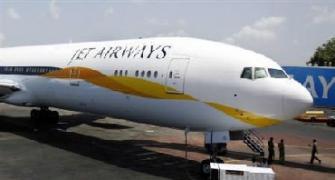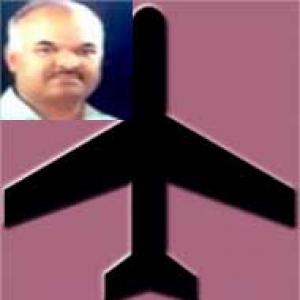 Airlines are taking the green route to save aviation turbine fuel, as rising crude oil cost is eroding their profitability.
Airlines are taking the green route to save aviation turbine fuel, as rising crude oil cost is eroding their profitability.Last week, Dubai-based Emirates Airlines claimed in its environment report that its fleet was 26 per cent more fuel efficient than other carriers'. It listed various measures, including low-emission operations, recycling of on-board waste, as factors responsible for this achievement.
Airlines like IndiGo and Jet Airways have been quick to take the cue to keep their fuel costs under check.
For example, low-cost airline IndiGo has advised its pilots to save 100 kg of ATF on each trip by following fuel-efficient flying procedures. (The fuel indicator in the cockpit displays aviation fuel in kg, though when it is supplied it is measured in litres.)
"There is a list of procedures that can help reduce fuel burn. For instance, IndiGo pilots have been instructed to taxi the aircraft to the bay on landing on single engine.
"Usually, it takes 5-10 minutes to reach the boarding gate and keeping one engine switched off helps reduce fuel burn.
"The pilots have also been told to use thrust reverser on idle mode to decelerate the aircraft speed after landing," a source from the airline said.
IndiGo has 41 Airbus A320s and operates 259 daily flights.
Hundred kilograms of ATF saved means an approximate saving of 120 litres of fuel on each trip.
A Boeing 737 or an Airbus A320 burns five to six tonnes of fuel on a Mumbai-Delhi
trip.
Assuming that even 10 of the flights achieve 100 per cent saving target, the airline saves more than a tonne fuel daily.
Earlier this year, IndiGo signed an agreement to buy Airbus A320neo, which are 15 per cent more fuel efficient.
These planes will be inducted only after 2015.
Jet Airways is also taking steps to keep fuel burn under control.
The proposed European Union emission trading norms also require airlines, which fly to Europe, to control emissions.
This has resulted in Jet taking several steps.
The other reason is rising fuel costs.
The airline, which made a consolidated loss of Rs. 128 crore (Rs. 1.28 billion) in the first quarter, blamed it on "irrational" pricing by rivals and rise in fuel costs, which account for 40 per cent of its expenses.
In it first-quarter result statement, Jet said it spent Rs. 655 crore (Rs. 6.55 billion) more than last year on fuel.
A lighter aircraft consumes less fuel and hence, the airline is taking steps to reduce cabin weight.
This is being done by reviewing and reducing the number of pages in inflight magazine and number of copies being carried on board.
Also, it is using containers, galley equipment and tableware, which are lighter in weight.
Earlier this week, the Directorate General of Civil Aviation issued a circular to all airlines to set up in-house environment cells and develop action plan to control emissions and aircraft noise.









